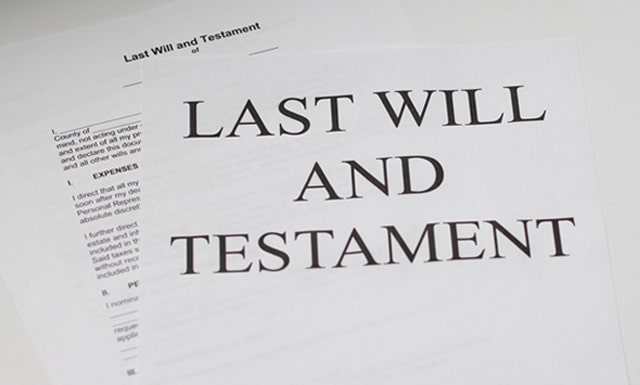
“… in this world nothing can be said to be certain, except death and taxes.” – Benjamin Franklin.
Estate Planning. Maybe you have heard the term and maybe you haven’t. Either way, welcome to Estate Planning 101 – an overview of all things “Estate Planning”. An estate plan is usually thought of as a few documents put together to legally redistribute assets and finances like life insurance, real estate, and personal belongings after someone dies, in the form of a last will and testament. While the last will and testament is crucial, there are other legal documents that can be drafted to complete a full estate plan. An estate plan, essentially, is a broader plan of action for your assets both while you are living and after. Documents in an estate plan consider the needs of family members, property and other assets you own, your personal wishes, and even end of life planning. Creating an estate plan is an incredibly individualized process that warrants hiring an experienced, trusted estate planning attorney to complete successfully. Facing your own mortality is not pleasant for most people. No one wants to think about dying and what the world will be like with them no longer a part of it. Unfortunately, as Mr. Franklin pointed out, death is a certainty for all of us. When you die, your possessions, land, real estate, financial securities, cash, and other assets (your “estate”) must be passed on to someone else. If an estate plan is not established, it can place a heavy burden on your loved ones who are already reeling from your passing. Fighting among family members can lead to costly probate and potentially even litigation as well as tarnish your legacy. Why must they be left to clean up your mess? If no plans are made, the law has made one for you. Every state has some form of intestate succession statute which provides for the distribution of assets upon death. To die “intestate” is to die without a last will and testament in place. Relying on the intestacy laws is not a well thought out estate plan. The laws are subject to change without your knowledge, and it is likely that the existing laws are not what you think they are and may not fall in line with what you would have wanted if you had taken action to create an estate plan before your passing. There may also be tax implications for estate planning decisions which are best discussed with an attorney. What exactly is probate? Probate is the legal procedure that happens after a person (a “decedent”) dies. It occurs whether a person died with (testate) or without (intestate) a will. A will names an “executor,” or the person tasked with carrying out the wishes of the decedent and disbursing the decedent’s estate to their heirs. The executor files a petition to open probate and qualifies as the representative of the estate. Once this has been accomplished, the executor notifies the persons named in the will and creditors that the probate process has begun, takes an inventory of the estate’s assets, and has any appraisals done if they are needed. The executor takes charge of paying taxes and other debts of the estate and once all has been settled, the assets remaining can be distributed and probate is closed.
A last will and testament is a legal document that sets forth your wishes regarding the distribution of your property and the care of any minor children in the event of your death. Having your will prepared by a Virginia trusts and estates attorney will ensure that your will satisfies all the requirements necessary to make it valid.
Anyone over the age of 18 should have a will. With a will in place, you can be clear about who inherits what and how much from your estate as well as who does not (such as an estranged relative). You can identify who you wish to care for your minor children should you pass before they reach the age of majority. Your will can provide peace of mind to your heirs that they will not have to go through a difficult intestate probate process.

Should both parents pass together, the prudent person will have included the name of a guardian for their children in their will. In some circumstances, a parent will also want to name in their will a preferred guardian other than the surviving parent. Although the law assumes that the remaining biological parent will automatically be guardian, if circumstances warrant a different outcome, the stated wishes of the deceased parent in their will can have great weight.
An attested will is a will that has been formally drafted, signed by you and two witnesses, as well as notarized. This is the most legally sound type of will and the least likely to be challenged in the probate process. However, there are other types of wills considered valid in Virginia.
Holographic wills are those that are handwritten, completely and entirely in your own handwriting. These types of wills often occur out of an emergency situation where there is no time to formally go through the estate planning process with an attorney and are far less desirable for probate purposes. For a holographic will to be considered valid, there must be at least two non-interested witnesses available to prove its authenticity. Expensive court action might be required to establish the holographic will as your will.
An oral will, where your wishes are spoken aloud but never put in writing, is not considered a valid will in Virginia. No one should rely upon wishes that have been stated to others but not committed to a formal writing.
A pour-over will is a type of will that is utilized in tandem with a revocable living trust. A pour-over will directs any assets that are not placed in trust during your lifetime to your trust.
A married or committed couple may wish to execute this type of will (occasionally business partners) however, joint wills are no longer acceptable in Virginia and prior to this formal rejection, the practice was discouraged. If you have a joint will currently, it should be rewritten into two separate wills. It should be noted, however, that a Contract to Make a Will (a contract that the other spouse won’t change the will after the death of the first spouse) is enforceable.
Wills usually include most assets, however payouts from your life insurance policy are not included as those policies generally already have specified beneficiaries to receive the proceeds. Accounts that are designated as “transfer on death” are often omitted as well. Of course, there is an exception to the rule; if your beneficiaries predecease you, the policy or account would then revert to the estate for distribution in accordance with the terms of your will.
While a will is great start to your estate planning needs, a trust can come through where a will falls short. Trusts come in many forms and a person, animal, or charity may be a beneficiary of a trust. Frequently used trusts in Virginia include revocable living trusts, irrevocable trusts, pet trusts, charitable trusts, special needs trusts, as well as a variety of other trusts.
A revocable living trust is frequently recommended as an excellent estate planning tool. This type of trust can be amended or revoked at any time by the trust maker (the “Grantor” or “Grantors”). It not only provides for the smooth transition of assets upon the death of the Grantors but also provides for the Grantors’ care during their lifetime.
When a Grantor places assets into a trust, the trust now owns those assets. The Grantor, however, retains complete control over those assets because they also serve as the Trustee (meaning they oversee everything in it) and as the initial beneficiary (meaning everything in the trust is used for their benefit). The Grantor designates secondary beneficiaries of the trust who will become beneficiaries upon the death of the Grantor. The Grantor will also name successor trustees for the trust, who will manage the trust if the Grantor dies or becomes incapacitated.
There are many reasons why estate planning attorneys frequently recommend a revocable living trust. Some of these include:
Probate can be unpleasant. It is often a burdensome, lengthy, and expensive process. The person who bears the weight of this burden is the executor. Most people who become executors do not understand the process and find it difficult to navigate as well as incredibly time consuming. With a revocable living trust there is no need for probate because the person who has passed did not own the assets that are left to the secondary beneficiaries.
A trust can allow for distributions to a minor, to be held in trust without the need for a court-appointed guardian. Trusts can also dictate that the distribution of assets to a young beneficiary will be delayed until they have obtained a slightly more mature age beyond the age of eighteen. While a will can have a trust (called a testamentary trust), these types of trusts are generally court supervised and therefore expensive.
If a married couple crafts a revocable living trust as part of their estate plan, and one spouse pre-deceases the other the assets can pass easily to the surviving spouse because they are owned by the trust, not the decedent. There is no need for probate.
In the event the surviving spouse remarries (perhaps even in very old age, to a less than desirable individual looking to inherit assets) and they draft a new will with their new spouse, as long as the trust remained in effect, the remaining assets in the trust will still be dispersed how the original parties to the trust intended.
If a Grantor becomes incapable of managing their affairs and/or finances, the successor trustee can take over management of the trust and the assets within it. The ability to have a successor trustee step in, when necessary, can save legal fees and doctors’ fees on conservatorship or guardianship proceedings through the Court.
In some courts, there can be extensive delay in having a will admitted to probate, getting before the court to have certain decisions made or complete tasks needed for the administration of property passing through a will. These sorts of delays (often caused by the probate process) and more likely to be avoided by using a revocable living trust. However, it is important to note that if legal action is pursued, a trust can be delayed much the same way a will can.
“Will contests” often come about due to claims that a will is a product of fraud, or the mental capacity of the executor of the will is up for debate. Because a trust is technically a contract it requires a higher level of capacity to enter into a one and they are less frequently called into question.
Irrevocable Trusts are generally used as a tax planning tool or in instances where assets may need to be protected from creditors. Irrevocable trusts can only be altered or terminated once the Grantor dies.
A special needs trust is usually created for the benefit of an individual with a disability. They are especially helpful in preserving eligibility for Supplemental Security Income and Medicaid benefits for the beneficiary. Funds gifted to a special needs trust are not counted as “income” or “resources” that would disqualify the beneficiary from receiving other important benefits or services. Special needs trusts can be especially helpful in cases where a disabled child of a decedent stands to inherit assets from the estate. There are potential downfalls to a special needs trust which would need to be discussed with an experienced wills, trusts, and estate attorney.
If a charity is part of your estate plan, a charitable trust may be a wise choice. To create a charitable trust, the charity that you intend to make a donation to must have a valid charitable purpose such as relieving poverty, advancing education or religion, promoting health, or supporting arts and culture. Charitable trusts often have hospitals, churches, or higher learning institutions as a beneficiary.
A Pet Trust can be used to provide physical and financial care for your pet after you die or become unable to care for them. Your pet would be named the beneficiary of the trust and the trust would establish who would care for your pet once you are no longer able.
A power of attorney is a document that can be drawn up then used to manage the finances and other affairs of an individual once they are no longer able to do so on their own. A person can provide power of attorney to a designated individual of their choice, commonly referred to as their “agent,” to act on their behalf with regard to financial matters as well as to represent their best interest and make other decisions on their behalf. A power of attorney can be specific, limited, or general as well as have the option of being durable or springing. It should be noted that these documents are powerful and not recommended for every client or situation. An experienced wills, trusts, and estates attorney can offer advice regarding whether a Power of Attorney is right for you on a case-by-case basis.

A specific power of attorney can be used to provide your agent with particular authority to carry out one task, such as a real estate transaction.
With a limited power of attorney, no broad authority is given. The document will state very precisely what your agent is able to accomplish on your behalf and those powers will be nothing more than what is listed. This type of power of attorney is often used in conjunction with trust documents, generally to aid the Trustee in personal matters that are outside of your trust.
A general power of attorney is the most far-reaching power of attorney that can be given to an agent. Very broad terms are given, and your agent has complete control over your affairs from the point the power of attorney is executed. However, these types of power of attorney do not last if you lose your mental capacity to make your own decisions.
A durable power of attorney remains in place, even if you are no longer able to make decisions on your own. A durable power of attorney is common for individuals nearing the end of their lives who need the assistance of another person to manage their affairs. A durable power of attorney requires very specific language and should be drafted by a wills, trusts, and estate attorney with the experience necessary to ensure the document is valid. Any power of attorney can be made “durable,” however it most frequently applies to a general power of attorney.
A springing power of attorney only goes into effect with certification of a physician or physicians (depending upon how the document is drafted) determines you are incapable of handling your own financial affairs. The disadvantage of this type of power of attorney is that there is frequently a delay in being able to use the power of attorney which may interfere with its usefulness.

An advanced medical directive is a combination document consisting of a medical power of attorney and a living will. The medical power of attorney portion gives your agent the authority to make medical care decisions on your behalf. This document also allows you to set forth your wishes for medical intervention and end-of-life care in the event you cannot make those decisions for yourself. You can specifically state what you want and do not want (i.e., ventilators, feeding tubes, resuscitation efforts, etc.). Your agent can only begin making decisions for you if you become unable to communicate your wishes. When creating an estate plan, it is advised that your wishes regarding the disposition of your remains be included in your advanced healthcare directive.
The first step in creating an estate plan is to sit down with a knowledgeable estate planning attorney and discuss your options. The wills, trusts, and estate attorneys at Parks Zeigler have decades of experience and are prepared to assist you in making the best choices for your individual situation. While many people believe that creating an estate plan takes a lot of work on their part, we strive to make it as easy as possible and less time consuming that one would think.
If you do not have an estate plan, or need to modify your existing estate plan, or if you simply have questions about the process, contact our experienced Virginia estate planning attorneys today at 888-691-9319 for a consultation and to get started, or fill out this short form today.
With an office near Town Center, Virginia Beach and a second location beside the Chesapeake courthouse, our team provides quality legal representation across the entire Hampton Roads Area.
Let Us Help! Call us on 888-691-9319 or fill out this quick form and we will contact you within 24 hours!
Parks Zeigler, PLLC – Attorneys At Law
 N/a
N/a